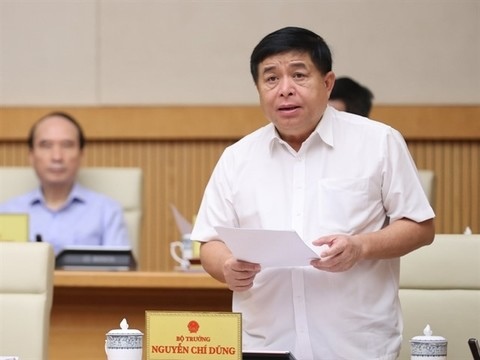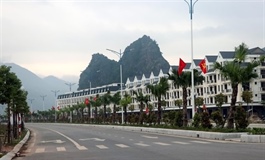MPI unveils two economic growth scenarios for this year
MPI unveils two economic growth scenarios for this year
The Ministry of Planning and Investment (MPI) has proposed two economic growth scenarios for this year at the Government's regular meeting held in Hà Nội on Thursday.

Minister of planning and investment Nguyễn Chí Dũng speaking at the Government's regular meeting held in Hà Nội on April 3. — Photo baochinhphu.vn |
They are based on the economic results of the first quarter, and economic growth forecasts for the second quarter and the whole year, said Minister of Planning and Investment Nguyễn Chí Dũng.
According to the ministry, the economy is projected to grow by 6-6.5 per cent in line with the target initially set by the National Assembly.
The first quarter of 204 saw positive growth in various indices, with GDP expanding by 5.66 per cent, the highest January-March level since 2020. Macroeconomic stability is maintained, with inflation kept under control at 3.77 per cent compared to the last year.
In the first scenario, GDP would grow by 6 per cent, lower than the National Assembly’s growth target. This scenario forecasts growth of 6.12 per cent for the rest of the year, with 5.85 per cent in the second quarter, 6.22 per cent in the third quarter and 6.28 per cent in the fourth quarter.
The second scenario envisions achieving GDP growth of 6.5 per cent for the entire year. Under this scenario, GDP growth for the second and third quarters is projected at 6.32 per cent and 6.79 per cent, respectively, with a notable surge to 7.08 per cent in the last quarter.
While the ministry recommends scenario two, aiming for 6.5 per cent GDP growth this year, it acknowledges that this ambitious target can only gain under favourable global and domestic conditions. Successful attainment also hinges on how new supportive fiscal and monetary policies are carried out.
To reach the target, the ministry recommends many key and specific tasks and solutions to complete the set goals and tasks.
In particular, Việt Nam needs to focus on developing and promulgating legal documents guiding the implementation of four amended laws. They include the Land Law, the Law on Credit Institutions, the Law on Real Estate Business, and the Law on Housing.



























